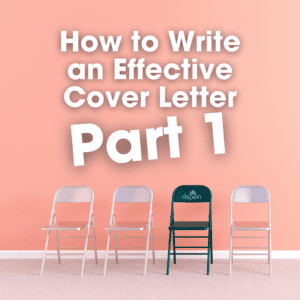POSTED Friday 16-09-22
How to Write an Effective Cover Letter – Part 2
Hello, and thank you for joining us here again. Last time on How to Write an Effective Cover Letter – Part 1, we looked at addressing the recruiting manager properly and professionally and the introduction section of your cover letter with Lauren.
Our hints and tips will help prepare you for that important application for the new trustee position you have been eyeing. Or any of our other fantastic roles on our website.
Main Body of your Cover Letter
Next up is an applicant’s most worrying part of a cover letter. In your main body, you’ll want to provide specific examples of your experience and successes and what you achieved and overcame.
When referring to specific, I mean particularly specific. Think about things you can’t discuss on your CV or fit in due to trying to keep your CV concise. For example, discuss exactly how many people you managed and the project’s precise outcomes. Anyone can say they managed a ‘large’ team; that’s too vague to tell your reader very much. But not everyone can say they managed a team of 30 people with such-and-such outcomes and successes. A specific example like this will set you apart from other applicants if you can be clear and precise about your achievements.
Something I see more often is a little concerning if I am honest. Perhaps this is part of the conflicting advice from different sources over the years, but let me be precise. Do not refer to yourself in the third person in your cover letter. I have seen this myself with applicants I have worked with in the past. I’d hazard a sensible guess and suggest that the people I have worked with initially framed themselves in the third person, making it feel like a third-party endorsement. For example, “David has excellent organisational skills”. But trust me, your reader will know that you wrote this. So all you’ve done is miss out on the crucial part of your main body: the specific examples of your experiences and successes. Nothing malicious here, of course, just likely dated advice that is no longer effective in today’s market.
Considering that, it’s essential in your main body always to consider your reader. Will they, for instance, understand technical terms and phrases? Especially in finance, the chief executive of a finance company will not necessarily understand all the technical jargon that comes with specific financial roles. As tempting as it is, don’t feel the need to make yourself look impressive with technical language. The reader will be more ingratiated with you if you write concisely and coherently. By doing so, you’re making it easier for them to read and understand your cover letter.
And finally, you must ensure that you connect with some of the essentials of the person specification. If possible, align your example achievements with the organisation’s business plan, direction or general mission. The reader should learn about your achievements and experience in the context of how it could benefit their business.
Thank you for taking the time to read my blog. We will see you again on September 30th for part 3 with David Currie.
Kate Kennedy
Consultant




